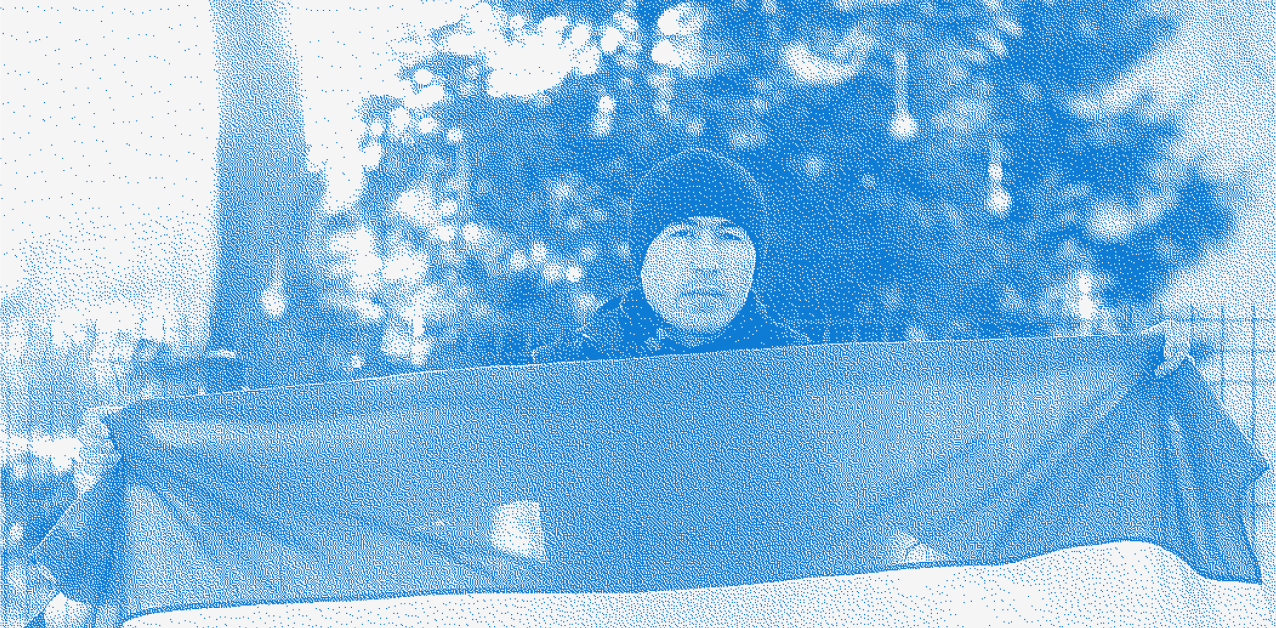In 2014, a group of Bashqort ethnic and human rights activists founded the national public organization Bashqort. In addition to actions in support of the Bashqort language, culture and republican sovereignty, members of the organization advocated for the preservation of nature and ecology of Bashqortostan. They played a crucial role in the confrontation around Toratau and Kushtau Single-standing mountain or hill with a pronounced peak prominent in relief..
In May 2020, the organization was declared extremist and banned by the Supreme Court of the Republic of Bashqortostan; the activists' attempts to appeal the court's decision were unsuccessful. In November 2021, one of Başqort leaders Ruslan Gabbasov had to flee Russia under the threat of political persecution. Beda Collective spoke with him about the colonization of Bashqortostan, the reasons behind the participation of different ethnic groups in the war in Ukraine and his views on the republic's future.
— How did you get involved in activism?
— I was first politicized in 2011 when I joined the Quq Bure organization. Quq Bure means sky wolf in Bashqort. Just in several months, I became vice president of this organization. Our ideas about necessary action diverged, let's put it like this. Eventually, two other vice presidents and I decided to split off and start our own movement. This was the beginning of Başqort.
Our organization was successful and developed rapidly. I was its vice-head, and ideology was my responsibility. Our main concerns were the protection of the rights and interests of Bashqort people and the autonomy of Bashqortostan. We were promoting Bashqort language and deepening federal connections. When ecological conflicts arose, we stood up for our nature.
We had broad support. By the moment we were declared an extremist organization in May 2020, we had 17 regional branches. Several of them were outside of Bashqortostan. We had more than one thousand active members and tens of thousands of supporters. For example, our public group on VKontakte (Russian: ВКонтакте, meaning InContact) is a Russian online social media and social networking service. It is the most popular social media in Russia since the end of 2008. had about sixty thousand followers.
— You call yourself a Bashqort nationalist. The term nationalist has been given negative connotations by Russian propaganda. What does it mean to you to be a nationalist?
— I can't see anything negative here. There are nationalists in political debates in developed countries all over the world. Nationalists have their own organizations which participate in the elections and sometimes win them. National ideas were crucial for the foundation of such modern states as South Korea and Taiwan.
Why does the term nationalist have negative connotations? That is because there are national republics among the subjects of the Russian Federation. Their number was even higher in the Soviet Union. Each one of them had its own rights and interests. Each one was trying to stand for its freedom, let's put it like that. Obviously, the colonial center is not fond of it.
As I understand it, a nationalist is someone who loves their culture, their people, their language, their traditions, and their history. They don't think that their ethnicity is superior to others, they don't belittle any other nation. We respect other cultures, their traditions and languages, but our love for our nation is stronger.

— Tell us about your political program.
— We have our platform—Bashqort National Political Centre. We have put forward a project for a future governmental system of Bashqortostan. It builds on ideas of Airat Dilmuhametov, leader of the Bashqort nationalist movement and our ideologue. He was arrested for voicing his ideas. Now he is serving a nine-year sentence.
We believe that the Republic of Bashqortostan should be multi-ethnic. Today there are three major ethnicities in Bashqortostan: Bashqorts, Russians, and Tatars. Apart from that, about 100 000 Mari people and roughly the same amount of Chuvashs. Our republic is not monoethnic, which is the case, for instance, in Chechnya. Our principle is, accordingly, to build a Bashqort political nation. It has to be a civic nation uniting all the ethnicities of Bashqortostan and everyone who considers this place their home and motherland. They will build their future in Bashqortostan as a people, irrespective of their ethnicity. The whole population of Bashqortostan took part in Kushtau Shihan is a mountain in Ishimbaysky District of Bashkortostan. In 2018, the authorities of the republic transferred it to the leadership of the Bashkir Soda Company for limestone mining. The development of shihan triggered mass protests. They started in August 2020 when construction equipment appeared near Kushtau. Activists, later joined by locals, set up a tent camp at the foot of the mountain. For two weeks, protesters have been facing violence from law enforcement and private security hired by the Bashkir Soda Company. The protests resulted in the recognition of Kushtau as a specially protected natural area., regardless of their ethnicity or confession: Muslims, Christians, Bashqorts, Tatars, Russians, Chuvashs, Chechens, and plenty of others. That was a moment that brought together everyone who thought that these mountains are not for sale. They are the heritage of our republic and hence the heritage of the whole political nation.
Bashqorts are not superior in this political nation. Everyone has the same rights. Still, Bashqorts have to be the leading force, at least because the case is about the land of Bashqort people. We inherit this land from our ancestors who shed blood for it resisting conquest and colonial policies. We are responsible for this land. We got this land from our ancestors, and we have to pass it on to our descendants. Bashqorts are the leading power, but this gives us no privileges. This is more of an additional responsibility. Our collective responsibility.
Every inhabitant of Bashqortostan will be given a choice to swear their loyalty to the Republic, its laws, and its constitution. Those who decide not to swear will still stay citizens and will not be deprived of any rights or social guarantees. However, they will not be able to participate in politics: they won't be allowed to vote or be elected. Many people believe that this is a discriminatory practice, and they don't like it. I don't think so. If a person wouldn't swear loyalty to the Republic, the place they live in, the place they call their home, then they must have unhealthy thoughts and desires.
On a more global scale, we propose a confederation of republics, somewhat like the European Union. We propose a single currency zone with no customs borders, designed with respect to the specific economic conditions of each state. Perhaps it should also have united armed forces, which should consist of armies of the national republics modeled after NATO. This is our vision of the future.
— You insist that Bashqortostan needs a high political culture so that people of other ethnicities would want to become Bashqort. What does this mean?
— Bashqort people used to live on wide lands from Chelyabinsk to Volga. The term Тарихи Башҡортостан (Bashk.) is a term proposed by archeologists N. A. Mazhitov and A. N. Sultanova in 1994 as a scientific definition of the historical and geographical area of formation and development of the Bashkir people. The borders of the region fall on the territory of the Volga Region and the Southern Urals. The designation is still not entirely clear. Historical Bashkortostan is thought to have included the modern Chelyabinsk and Orenburg regions, parts of Tatarstan and Udmurtia, areas in Sverdlovsk, Kurgan, Samara, Saratov regions, and Perm Krai, as well as parts of the Republic of Kazakhstan. The earliest information on this historical territory is found in Divan Lugat at-Turk (1072-1074), a collection of Turkic dialects by Mahmud al-Kashgari, a Turkic philologist. describes these territories. Some people think we should take this land back. I keep telling them this is impossible. Today we cannot become the [ethnic] majority in our republic. How could we conquer new territory? What do we need it for? If we want the lands of our ancestors back, the best way is to convince the population of those lands to become Bashqort. For that purpose, Bashqorts should be educated people of high culture and ethical standards. We need to be good entrepreneurs. We should have the qualities of people you want to be friends with, who you want to be family with.

— What would you do with the collective history of Russians and Bashqorts? For instance, no Russian history books mention the violent colonization of Bashqortostan. Do you think we should start talking about suppressed uprisings and tens of thousands dead Bashqorts?
— Certainly. These sensitive issues need to be resolved. Otherwise, every new generation will have to bring them up. Tragic moments in history do not fade away; they will be remembered. They stay in archives, in people's memory, they are passed down through generations. We will never forget it. Unless there is some kind of reconciliation, new conflicts will arise.
For example, the US has recognized the genocide of their indigenous peoples and given them some privileges and rights, which is the best way there is. Even though there still might be some issues for discussion, this is a precedent that lays the ground for further dialogue. Let me give you a clear example: the Germans after the Second World War. Germany lost the war, Germans took responsibility, and they could turn the page. This never happened in our country. That is why we need to find all the sensitive events in the joint Russian-Bashqort history. We need to talk them through. We have to discuss the reasons behind the colonial conquest and numerous rebellions. We need this in order not to repeat past mistakes. Why has this all started? Who is to blame? This needs to be discussed in schools. If everyone hears this from their childhood, the whole population will be aware of these issues.
Nowadays, the history of the Republic of Bashqortostan is taught as a part of Russian history, a very short part of it. The regional component is absent from education. Formerly Bashqort history had been a separate school subject, just like the literature and culture of Bashqortostan. Today this is not the case. In my school days our history was taught from the 15th century onwards. The first event mentioned was the mergence of the part of Bashqort people with Moscovy. As if there had been no prior history. It is always a shock to anyone to find out what was before that time. Take, for instance, In the Bashqort language, the village is called Һөйәнтүҫ. as it is called now in Russian. A thousand Bashqorts It happened during the Bashkir uprisings of 1735-1740. The Bashkirs protested against the use of their lands by the colonizers. These uprisings were brutally suppressed. On January 24, 1736, Alexey Tevkelev shot and speared about a thousand Bashkirs. Аnother 105 Bashkirs were burned alive in the barn. there, and over one hundred people, including women and children, were locked and burnt alive. Everyone, including the Russians That is: in the Askinsky District of Bashkortostan., has to remember this and understand that this should never happen again.
— So, do you think there is a need for a new cultural policy?
— Yes. I was shaken as I found out about that event quite late in my life. I grew up in a village with a predominantly Russian population and graduated from school in 1996. We never studied the Bashqort language at school. Towards the end of our education, we were taught a little about the history and culture of Bashqortostan, the natural beauties of our land, but Seantoos had never been mentioned. The classes provided some information about our culture, traditions, and environment of the republic. That was it.
Don't get me wrong — I think our culture is remarkable. Anyone would agree. Everyone who lives in Bashqortostan, irrespective of ethnicity, is well-acquainted with it. I have never encountered any repulsion towards it. A lot of Russians enjoy drinking Bashqort koumiss and eating horse meat. On Sabantuy they take part in horse racing and Kurash is a traditional Turkic wrestling. wrestling. Sometimes Russians win these tournaments. I think our culture is well-integrated into society.

— The majority of the soldiers who died in Ukraine were ethnic Russians. Still, Tatars, Kazakhs, Tuvans, Bashqorts, people of Dagestan, and other ethnicities serve in the Russian army. Why do you think they agree to participate in the war unleashed by the Kremlin?
— The first reason is that national republics are mostly poor. The standard of living there is low. The same goes for Russian regions. Why do we see just a few soldiers from Moscow and St. Petersburg? Because the standard of living there is higher. Not everyone would agree to sign a contract and fight when they could, say, get a job as a manager with a salary of 80 000 rubles.
The second reason, in my opinion, is that there are many young people with high passionarity living in the national republics. Their will to protest grows every year in the conditions of a deteriorating economic situation. And by adding a national factor to economic motives, even more explosive mixture is obtained. Therefore, the passionaries must somehow be eliminated, so they are sent to war.
The third reason is quite conscious. Putin wants to smear everyone with blood. He wants to put collective responsibility for the war on the shoulders of every ethnicity. This is the meaning of his already famous words: The original Putin's quote is as follows: “I am Lak, I am Dagestani, I am Chechen, Ingush, Russian, Tatar, Jew, Mordvin, Ossetian. I can't list it all.”. He wants the entire multinational people of the Russian Federation to fight Ukrainians. To get everyone stained with that blood.
— Now to our usual question: what do you think Russians need decolonization for? Do they need it at all?
— A lot of people, the deep nation, still do not realize that Russia is a violent empire rather than a grand state. Any greatness would manifest differently. It is especially hard to grasp for someone from Ryazan or Nizhny Novgorod Regions, who has never thought of issues of national republics. These people think, for instance, that Kazan should always be a part of the empire: “Why would we give it away to Tatars? Why would they have a special status? Or, for example, those Yakuts; they live so far away, what is their fuss all about?”
The first thing these people need to understand is that we are different. We have our republics, our own state, our history, and our culture. We are just not the same. We want to live separately and choose our own path. This is the hardest thing to get across to Russians. From early childhood, their minds are filled with ideas of great Russian culture. You can see that in the simplest cases. For example, a birch growing in Bashqortostan would be a Bashqort birch. They still would call it Russian. Or take, for instance, Russian winter. Why is it Russian? Winter in Sakha would be Yakut winter, not Russian.
What you see here is the Great-Russian Chauvinism is the attitude of national superiority towards members of another ethnic group with the purpose to justify the right to discriminate, exploit and oppress other people. Chauvinism contributes to the spread of dislike and even hatred on the principle of different—stranger—alien—enemy. It is a form of xenophobia. and the self-consciousness of an Empire, which are imposed upon children from their earliest ages. But these ideas are hollow. For example, those who write comments in favor of war often say that Russia has never attacked any state. This is just a dull repetition ofDmitry Peskov is the press secretary of Russian President Vladimir Putin since May 2012. On February 20 this year in an interview with Russia 1 TV channel he said: “May we remind you that Russia has never in its history attacked anyone? Russia had to go through a great number of wars. It is the last European country which would even utter the word ‘war’.”. When I come across this kind of comments, I make a brief list of aggressions. I mention only relatively recent cases from the Soviet times onward. And they shut up; they have no answers since their ideas were simply imposed.
A nation with such self-image, such thoughts would take the defeat very seriously. Just like the Germans led astray by Goebbels's propaganda, who were unable to believe all the atrocities their soldiers had committed. They had to visit concentration camps and gas chambers. It took them digging out mass graves to realize the scope of horror. Something to that effect will have to happen in our case. Denazification is most needed in Russia itself. We have to talk about all the atrocities. We need to dig up the archives and explain what we find to the masses. I think we will accomplish nothing if we ignore this step. Everyone has to realize this on their own. If that doesn't happen, chauvinism will re-emerge. Once again, we have seen it in Germany after the First World War.
I also think we need to raise the national consciousness not only of the indigenous peoples but also of Russians themselves. They need to understand that they have been used as tools to build the colonial empire. They were used to conquer other people, and they paid for it with their own blood.

—What do you think the Bashqort people should be doing now? Those who left the republic and those who stayed?
— I am convinced that the overwhelming majority of Bashqorts are against Moscow. I know the air my people breath, and I know they have the same ideas. Many people are afraid of the word ‘freedom’ and the very notion of independence of our republic. They don't believe that this is achievable yet. They have the mindset of the old librarian in Shawshank Redemption: “How is it possible for us to be free? How would we live our lives then?”
When people say that we won't be able to live independently of Russia, I ask them: how have Moldovan or Uzbek people managed that? Couldn't we do the same? If they can live in their nation-states and work for the best of their lands, why couldn't we do that? Are we worse than them? Of course not! That is why I want my people to understand that the most important thing to do today is to oppose the crimes of the Russian government and those who collaborate with them in the power of Bashqortostan Republic. We don't have to be led by them. Soon it will be over.
I don't condemn those who remain silent. The authorities forbid any free speech, and Ruslan Gabbasov had to flee Russia in November 2021 under the threat of persecution for his activism. In Lithuania, he applied for political asylum.. But if you are not ready to speak up, it is better to remain silent. You should not support Putin and this government, you should not call for war and so forth. It is better to do nothing and wait. Prepare for the ‘zero-hour’, as I call it. Perhaps you should read more and take some time for political self-education.
I have already said that professionals in each domain should draft plans for the future of their respective spheres. For example, teachers and other education workers should start thinking about what they will change in education when the Republic of Bashqortostan can determine its own fate. In a scenario where there are our own masters, and there are no forced directives from Moscow. We have to start thinking about how to organize our education so that entering Harvard and Oxford would not be a significant challenge for our children. The same goes for economists. They should be asking themselves: how do we organize the economy of the republic? I think that is what the educated class should be doing now. We need projects and blueprints for the time our republic is free.
Those Bashqorts who have left the Russian Federation have to understand that we are the only ones who can speak up for the Bashqort people openly and not be afraid of political persecution. And we are obliged to do that. We have to outline an image of our bright future, let's put it like that. When the time comes, we will have to join our efforts to create the Republic of Bashqortostan the way we want it to be.
